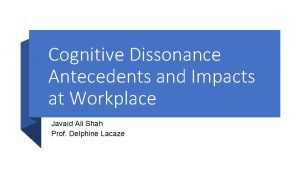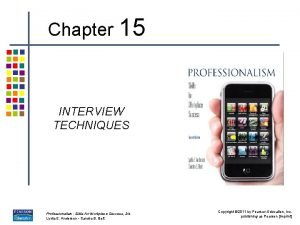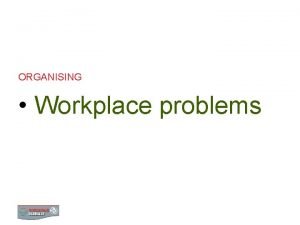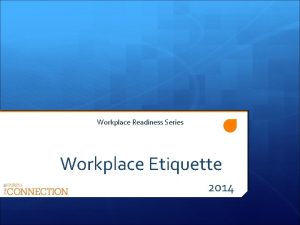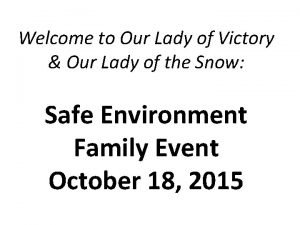WORKPLACE RELATIONSHIPS OR THATS NO LADY THATS MY


























- Slides: 26

WORKPLACE RELATIONSHIPS, OR THAT’S NO LADY THAT’S MY WIFE Copyright 2017, Allen Vellone Wolf Helfrich & Factor P. C.

INTRODUCTION Copyright 2017, Allen Vellone Wolf Helfrich & Factor P. C.

Copyright 2017, Allen Vellone Wolf Helfrich & Factor P. C.

RELIGION IN THE WORKPLACE Copyright 2017, Allen Vellone Wolf Helfrich & Factor P. C.

Legal Hot Spots • Do your Hindu, Sikh and Jain coworkers need a three-day weekend in November to celebrate Diwali? Did you know one colleague urging another to accept Christ as a personal savior may be a legally protected act? Did you cater a staff luncheon where a Jewish worker was unable to join in because the lunch meets were touching the cheese, which is not kosher? • More than ever, people want work that fits in with a larger sense of purpose in life. For many people, that includes a concept of God, or something like it. • Employees are feeling empowered to be more assertive about their rights to religious expression in the workplace. • Employers are contending with how to create workplaces that are comfortable and welcoming for employees of all faiths -and of none. Copyright 2017, Allen Vellone Wolf Helfrich & Factor P. C.

Overview of the Law • Title VII of the Civil Rights Act of 1964 prohibits employers, except religious organizations from discriminating against individuals because of their religion in hiring, firing and other terms and conditions of employment. • Employers may not treat employees differently because of religion • Employees cannot be required to participate or to refrain from participating in a religious activity as a condition of employment. • Employers must reasonably accommodate employees’ sincerely held religious practices unless doing so would impose an undue hardship on the employer. • Employers cannot refuse to hire a person or fire an employee based on a desire to avoid a prospective religious accommodation. • Employers must take steps to prevent religious harassment of their employees. • Employers may not retaliate employees for asserting Copyright 2017, Allenagainst Vellone Wolf Helfrich & Factor P. C. rights under Title VII

Reasonable Accommodation • The U. S. Department of Labor (DOL) defines "reasonable accommodation" as: (A)ny adjustment to the work environment that will allow an employee or applicant to practice his or her religion. The need for religious accommodation may arise where an individual's religious beliefs, observances or practices conflict with a specific task or requirement of the position or an application process. Accommodation requests often relate to work schedules, dress and grooming, or religious expression in the workplace. If it would not pose an undue hardship, the employer must grant the accommodation. • A religious accommodation entails the good-faith efforts of employers, employees and applicants, and must meet both the religious beliefs, practices and observances of the employee and the employer's job requirements or selection process. • Very often, the accommodations are simple to do. They just take a little of bit creativity, a little bit of working with the employee to find out what will work, what won't. • The difficulty becomes how do you accommodate what sometimes are different viewpoints? Copyright 2017, is Allenone Velloneperson's Wolf Helfrich & religious rights may • Sometimes what happens Factor P. C. conflict with another individual's rights.

Examples of Religious Accommodations • Flexible scheduling, schedule changes, voluntary shift substitutions or swaps; • Leaves for religious observances; • Job reassignments; • Modifications to workplace policies or practices, such as dress or grooming practices in which an employee engages for religious reasons. These might include, for example, wearing particular head coverings or other religious dress (such as a Jewish yarmulke or a Muslim headscarf), or wearing certain hairstyles or facial hair (such as Rastafarian dreadlocks or Sikh uncut hair and beard). It also includes an employee's observance of a religious prohibition wearing Copyright against 2017, Allen Vellone Wolf Helfrich & certain garments Factor P. C. (such as pants or miniskirts).

Undue Hardship • Just because an employee has sincerely-held religious beliefs does not necessarily mean that there are not restrictions which an employer can impose on the employee's exercise of them in the workplace. Even where a religious right exists, it has to balanced against the employer's interests to maintain a workplace. • An accommodation may cause undue hardship if it is costly, compromises workplace safety, decreases workplace efficiency, infringes on the rights of other employees, or requires other employees to do more than their share of potentially hazardous or burdensome work. Copyright 2017, Allen Vellone Wolf Helfrich & Factor P. C.

Employee Responsibilities • Employees seeking to observe their religious beliefs and practices have a responsibility to do their part to help resolve conflicts between job duties and religious needs. • Employees must tell employers about the religious commitment at the time the job is accepted or immediately upon becoming observant or aware of the need for an accommodation. • Employees must be clear when explailning why the accommodation is needed. • Employers are required to accommodate – subject to undue hardship rule – any of the employee’s sincerelyheld religious beliefs. Copyright 2017, Allen Vellone Wolf Helfrich & Factor P. C.

Sample Scenarios • An employee refuses to sign a workplace pledge concerning tolerance of differences because he believes it is immoral and against God’s word to tolerate homosexuals. Her manager orders him to sign it and he refuses. The employee is terminated. • A co-worker occasionally teases a Muslim employee about her hijab. Although the Muslim employee is offended and tells her colleague to stop, she continues to work productively and does not report it because the company has no reporting process in place. When the co-worker continues to tease, the employee informs her employer, who does nothing to stop the teasing. The employee quits. • A male appliance repairman who works by himself is one day told by his employer that he will need to work in the field with a woman. He tells the employer that his religion forbids him from working in close quarters with women who are not his family and requests accommodation that will allow him to keep working without the new requirement. • An employee is hired by a company whose mission statement in its Employee Manual states: “In order to effectively serve our owners, employees, and customers the Board of Directors is committed to: Honoring the Lord in all we do by operating the company in a manner consistent with Biblical principles. . ” The employee is an atheist and Copyright 2017, Allen Vellone Wolf Helfrich & informs the employer that she does not follow Biblical principles. Factor P. C. She is terminated.

Sample Scenarios Cont. • An employer requires an employee to attend a management seminar put on by the Institute of Basic Life Principles, which uses Bible passages to support its lessons. The employee informs the employer that he does not wish to attend. He is terminated. • A company required its employees to spend at least half their work days in courses that involved Scientology religious practices, such as screaming at ashtrays or staring at someone for eight hours without moving. The company also instructed employees to attend courses at the Church of Scientology. Additionally, the company required employees to undergo an "audit" by being connected to an “E-meter, ” which Scientologists believe is a religious artifact, and required the employees to undergo "purification" treatment at the Church of Scientology. The employees repeatedly asked not to attend the courses but were it was a Helfrich requirement of the job. Copyrighttold 2017, Allen Vellone Wolf & Factor P. C. When they refused to participate in Scientology religious

WORKPLACE DATING Copyright 2017, Allen Vellone Wolf Helfrich & Factor P. C.

Cupid in the Cubicle Co-workers dating each other is inevitable. Some even fall in love and marry. But workplace relationships always bring the potential for employer liability in harassment and retaliation claims, especially for a relationship that forms between a supervisor and a subordinate. Colleagues hooking up can also hurt productivity and impact morale due to tension over complaints of favoritism, public displays of affection, and inappropriate gossiping among co-workers. Copyright 2017, Allen Vellone Wolf Helfrich & Factor P. C.

Lawful Off-Duty Conduct • Employees have a reasonable expectation of privacy for off-the-job conduct, which conduct is protected by Colorado law. • C. R. S. § 24 -34 -402. 5 provides: It shall be a discriminatory or unfair employment practice for an employer to terminate the employment of any employee due to that employee's engaging in any lawful activity off the premises of the employer during nonworking hours unless such a restriction: (a) Relates to a bona fide occupational requirement or is reasonably and rationally related to the employment activities and responsibilities of a particular employee or a particular group of employees, rather than to all employees of the employer; or (b) Is necessary to avoid a conflict of interest with any responsibilities to the employer or the appearance of such a conflict of interest. (2) (a) Notwithstanding any other provisions of this article, the sole remedy for any person claiming to be aggrieved by a discriminatory or unfair employment practice as defined in this section shall be as follows: He or she may bring a civil action for damages in any district court of competent jurisdiction and may sue for all wages and benefits that would have been due him or her up to and including the date of the judgment had the discriminatory or unfair employment practice not occurred; except that nothing this section shall be Copyright 2017, in Allen Vellone Wolf Helfrich & construed to relieve the Factor P. C. person from the obligation to mitigate his or her damages.

Conflict of Interest • For workplace dating, the conflict of interest defense may be utilized by an employer to restrict its employees’ lawful off-duty activities if necessary to avoid a conflict of interest with any responsibilities to the employer or the appearance of such a conflict. • Conflict of interest defense is not limited to financial conflicts of interest. Nor is the employer required to show that the conflict of interest actually interfered with employee’s ability to perform the job. Copyright 2017, Allen Vellone Wolf Helfrich & Factor P. C.

Balancing Right to Privacy with Right to Protect Business • Employers should consider implementing policies outlining permissible and prohibited conduct concerning dating relationships with co-workers. These policies may prohibit relationships between those in supervisory/subordinate relationships, or between workers and vendors or clients. The policy should reference the company's anti-harassment policy and remind employees how to report unwanted conduct. The policy should detail alternatives if employees do engage in a relationship (such as the possibility of transfer to a new position with no reporting relationship or, if the policy is violated, discipline or discharge). • One possibility is a total ban on fraternization in the workplace (which is difficult as the employer would need to clearly define “fraternization”. ) A total ban is also problematic. If the employer discovers the relationship, are they going to require them to stop dating? Monitor them to ensure compliance? Fire both of them if they do not stop dating? Failure to treat both employees equally can open up an employer to disparate treatment claims. Copyright 2017, Allen Vellone Wolf Helfrich & Factor P. C.

Love Contracts • The idea of a “contract” may seem distasteful when it comes to romance. After all, there is nothing romantic about sitting down with a human resources representative, admitting to a relationship with a co-worker or supervisor, and committing the nature of that relationship to paper. • The “love contract” is an agreement that affirms that the relationship is consensual and remind employees of the conduct that is appropriate in the workplace, and have both employees acknowledge that the relationship is consensual. • However, “love contracts” are often intrusive or contrived, and if not applied uniformly, can lead to exposure for the employer. • The contract does not prevent other employees feeling they are subjected to a hostile work environment if the couple engages in romantic behavior at work. • Best approach might be to bar initiation of relationships between those in a supervisor-subordinate relationship, and perhaps between managerial employees, but leave the remainder of relationship issues to a well-crafted harassment Copyright 2017, Allen Vellone Wolf Helfrich & policy. Factor P. C.

Love Contracts Cont. • Employers should consider including the following elements in the contract: • Acknowledgement by both parties that the relationship is consensual; • An acknowledgement by both parties that, up to the date of the contract, no behavior has occurred that the employees believe violates the company’s policies; • Procedures the parties should follow if the relationship becomes nonconsensual in any way; • A statement summarizing or referencing the company’s policies on workplace romance, sexual harassment, workplace conduct and business ethics; • An acknowledgement by both parties that they are aware of and understand these policies, and the potential impact each has on their relationship; and, • A statement explaining what happens if either employee fails to abide by company policies. Copyright 2017, Allen Vellone Wolf Helfrich & Factor P. C.

WORKPLACE EVENTS Copyright 2017, Allen Vellone Wolf Helfrich & Factor P. C.

The Business Case for Fostering an Inclusive Workplace • To ease some of the stress and to make workers feel valued and important, many employers sponsor outings and events during the year. Holiday parties, family picnics, outings to local sporting events, book clubs, fantasy football, company softball leagues, and even the occasional off-site meeting are all designed to give everyone a break from the normal routine. • In all the fun and excitement, employers should not lose sight of the potential legal problems these types of events and outings can bring. • For example, parties may cause headaches for employers during the holidays. Christians commemorate the birth of Jesus. Muslims celebrate Eid al-Adha, or the Feast of Sacrifice. Some African-Americans celebrate Kwanzaa. Buddhists celebrate Buddha’s Enlightenment with Bodhi Day. The Jewish celebrate Hanukkah and the Festival of Lights, and there are many others. With so many different points of view, employers must be careful as they plan for a Copyright 2017, Allen Vellone Wolf Helfrich & holiday party. Factor P. C.

Title VII and Employer-Sponsored Events • Courts uniformly agree that Title VII is not a general civility code, and it is difficult for an employer to monitor and control the level of social interaction in workplace setting. • However, if individuals in protected classes are not included in these events, it can marginalize them and limit their knowledge, as well as lead to claims of discrimination or hostile work environment. • Providing certain groups of employees with marketing or networking opportunities, to the exclusion of other employees, may be deemed a discriminatory practice Copyright 2017, Allen Vellone Wolf Helfrich & Factor P. C.

What to Do • Explain that participation at the event is voluntary. • Do not exclude any employees because of race, national origin, gender, religion, age, or disability in work or social settings that are an extension of work in a way that appears discriminatory, such as not informing ethnic minority co-workers of work-related activities or social events. • Include in employee manual that company prohibits retaliation against any individual who reports discrimination or harassment, and that such policy applies to all work related settings and activities, whether inside or outside the workplace, and includes time in the field, business trips and business related social events. • Remind employees about policy against Copyright 2017, Allenthe Vellonecompany's Wolf Helfrich & Factor P. C. harassment and discrimination.

Sample Scenarios • Excluding a woman from fantasy football league and other social events, and then co-workers talking about the activities around her, even though she wasn’t invited to participate. • Employer does not invite employee’s partner to work related social events because she is transgender. Other colleagues encouraged to bring their partners and spouses along. • A congressman has an unwritten office rule that women staffers cannot be alone with the congressman in his office, driving alone with him, and are also barred from staffing the boss at evening work events. The same rule does not apply to men. • The owner of a janitorial service decides to have a “Holiday Party” for his office staff. He decides that the actual crews would be too cumbersome to invite so he does not include them. 98% of the office staff is white and 98% of his cleaning crews are Hispanic. Copyright 2017, Allen Vellone Wolf Helfrich & Factor P. C.

Questions? Copyright 2017, Allen Vellone Wolf Helfrich & Factor P. C.

Contact Information Kevin Allen kallen@allen-vellone. com Jennifer Schlatter jschlatter@allen-vellone. com (303) 534 -4499 Allen Vellone Wolf Helfrich & Factor, P. C. 1600 Stout Street, Ste. 1100 Denver, CO 80202 Copyright 2017, Allen Vellone Wolf Helfrich & Factor P. C.
 I hate careless people. that's why i like you
I hate careless people. that's why i like you Promotions o'cool
Promotions o'cool Thats normal
Thats normal What is the answer to life
What is the answer to life Daisy’s devine day
Daisy’s devine day Thats all im asking for
Thats all im asking for Uwb protocol analyzers
Uwb protocol analyzers Thats entertainment dance competition
Thats entertainment dance competition No thats not it
No thats not it Thats not fair
Thats not fair Identical rhyme examples
Identical rhyme examples Thats just rude
Thats just rude Overt and covert conflict in the workplace
Overt and covert conflict in the workplace Mastering soft skills for workplace success
Mastering soft skills for workplace success How to reduce cognitive dissonance in the workplace
How to reduce cognitive dissonance in the workplace What comes to your mind when you hear work
What comes to your mind when you hear work Cisco connected workplace
Cisco connected workplace Makalah perbedaan individu dalam organisasi
Makalah perbedaan individu dalam organisasi Osha safety videos
Osha safety videos Workplace readiness skills quizlet
Workplace readiness skills quizlet Workplace transport hazards
Workplace transport hazards Professionalism skills for workplace success
Professionalism skills for workplace success Workplace english 3
Workplace english 3 Ict workplace health and safety
Ict workplace health and safety Shape and color of whmis 2015 symbols
Shape and color of whmis 2015 symbols Serious injury and fatality prevention
Serious injury and fatality prevention Chronic unease in the workplace
Chronic unease in the workplace














